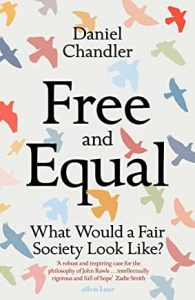A few weeks ago I read Thomas Aubrey’s All Roads Lead to Serfdom, which argued for an alternative philosophical foundation to simple-minded utilitarianism for economic policy, if market liberalism is to survive. In Free and Equal: What Would A Fair Society Look Like, Daniel Chandler offers a modern interpretation of Rawls as an alternative to Aubrey’s Ordoliberalism.
The first part of Free and Equal is a clear and useful summary of what Rawls said. It’s over 40 years since I read A Theory of Justice, so this was a terrific refresher. And indeed for a liberal-minded person there is much to like in the Rawlsian approach, which is presented here as both comon sense and yet quite radical given where we are.
The second part of the book takes the themes – freedom, democracy, equality of opportunity, shared prosperity and democracy at work – and analyses the current state of the world in the light of each. It has many policy recommendations, many of them familiar such as UBI, worker rights in gig jobs, proportional representation in elections, all justified in terms of the underlying Rawlsian philosophy. Again, there are some unexpected overlaps with the ordoliberal case for power dispersion: Chandler writes: “Properly understood, the difference principle is concerned not just with the distribution of income and wealth but with the concentration of economic power and control.”
It seems hard to disagree with the contention that both wealth and power have become too concentrated in the western democracries and some things badly need fixing. But reading Free and Equal so soon after All Roads Lead to Serfdom crystallised for me an uneasiness I have with both underpinning philosophies, namely their individualism. Take Universal Basic Income for instance. Chandler is an advocate, but recognises there are critiques – such as undermining the sense of purpose people get from work, or the cost. The one critique he does not address is the one I’m going to label the Coyle Critique: you can’t buy a public realm – transport services, decent schools, waste collection – with your UBI.
Both books have plenty of specific recommendations, and a fine liberal individualist philosophy, but no positive account of the public realm. Improving economic and social outcomes will require a shift in public philosophy away from the bankrupt post-1980 set of assumptions; while there is much to like and much sense in Free and Equal, it doesn’t achieve this, although recognising the need to get away from the false dichotomy of market fundamentalism vs statist socialism. It argues that Rawls’ ‘difference principle’ lays the foundation for “a richer and more nuanced conversation about our economic structures,” but for me it doesn’t add up yet to “a new and inspiring political economy.”
Still, it’s unfair to expect a ready-packaged answer. Free and Equal makes an important contribution to the conversation, also explored in the recent special issue of Daedalus and elsewhere. It’s an optimistic take, and it’s interesting to revisit Rawls in such depth.

